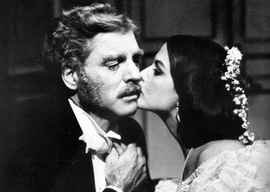
September 25, 2016

Burt Lancaster and Claudia Cardinale in The Leopard
Sicily – Under the watchful eye of Mount Etna the storied past of the island lies parched and yellowish, but as one gets nearer to the fiery growling giant the air turns cool, the sun glistening against black volcanic rock. Sicily is of two minds. Orange groves and beaches galore, then dank forests and possible lava flows. Sicily’s history resembles the landscape: Peaceful and religious, violent and vengeful.
I first sailed to Taormina back in the Sixties, visited the ancient Greek amphitheatre, and listened to Dvorak’s New World Symphony while breathing in the smells of history. It was an extraordinary spectacle: Beautifully dressed people, a great Italian symphony orchestra, and a sunset that illuminated the ancient site and brought alive its legends as it has for thousands of years. It was as romantic as it gets, and then some.
Back in 415 BC, the Athenian patrician Alcibiades pulled a number that signaled the end of Athenian hegemony. Alcibiades had a vision of the conquest of Syracuse and the foundation of a new empire of the west. Bogged down in a war of attrition with Sparta, the Athenians did a Bush-Blair, by invading Sicily. A vast armada was annihilated, as was the Athenian imperial mission. End of story, for Athens, that is.
I’ve often thought of Alcibiades and the Greeks landing in Sicily with conquest of Carthage in mind. I’ve sailed through Scylla & Charybdis, the Messina Straits, countless times, and had a knockdown once just as we were crossing in the middle of the two Homeric monsters. Sicily might not be good for Greek sailors, but oh, what a past. We once stopped to visit Prince Galvano Lanza, whose name features in The Leopard, and his staff was striking. He lay in his palazzo, immobile, a thousand year weariness etched on his face, reading about Napoleon. The staff eventually obliged and even put on their finest. Princes and servants, violence and ritual, church and no state, that’s Sicily for you.
Speaking of Il Gattopardo, Guiseppe di Lampedusa’s lyric lament for a disappearing world, and one of the greatest post-war European novels, the protagonist, Fabrizio, Prince of Salina, is probably my favourite fictional hero. An excellent horseman, a terrific shot, a tireless womanizer, Fabrizio is brave, intelligent, wise, a sinner, yet a loving family man with a very generous heart. He is a great aristocrat who understands the vulgarity of the upwardly mobile middle classes and new money.
As everyone except Kanye West, the Kardashians, and others of their ilk knows, the novel is set in 1860, with Garibaldi and his troops landing in Sicily when the Risorgimento begins in earnest. Landowning aristocrats and peasant tenants are in confusion, the contract between them undermined by various unfamiliar forces, political liberalism and a rising middle class. The prince takes it all in stride. He understands his own coming irrelevance, daydreams of past – and future lovers – remains conservative and mystical about his lands and his position.
Unlike other great books, the film of The Leopard by an aristocrat of Fabrizio’s ilk, Luchino Visconti, is equal to the novel. Visconti told a friend of mine that the one great riddle of his life was how an acrobat born and raised in the Bronx could play the Prince of Salina as if he were Lampedusa himself. This was Burt Lancaster in the 1963 movie, like the novel, probably the best film ever. One feels the prince’s pain as modernity approaches but he never expresses it. He watches the young dancing at the great ball at the end, and the yearning for his long gone youth is evident only in his eyes.